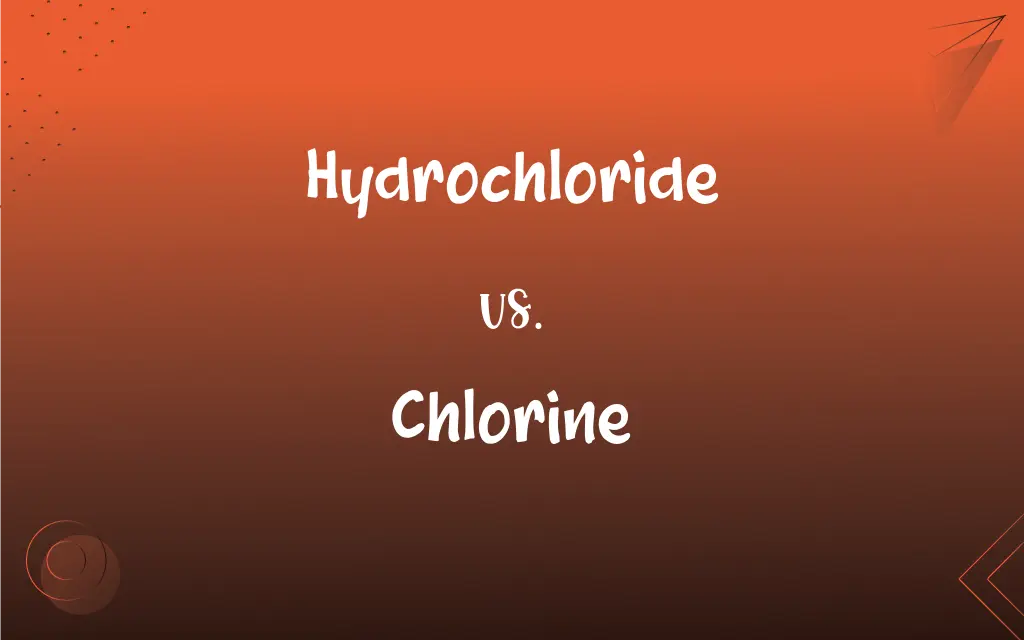Hydrochloride vs. Chlorine: What's the Difference?
Edited by Harlon Moss || By Janet White || Updated on October 5, 2023
Hydrochloride is a compound formed from hydrochloric acid, while chlorine is a chemical element with symbol Cl and atomic number 17.

Key Differences
Hydrochloride is a compound that is typically formed when hydrochloric acid combines with an organic base, often creating a salt. It’s commonly encountered in pharmaceuticals, serving as a counterion that makes organic compounds more water-soluble, thereby affecting their absorption and distribution in the body. On the other hand, chlorine is a chemical element, a halogen, known for its high reactivity and strong oxidizing properties. It's used widely, from disinfection processes to the manufacturing of consumer products.
Hydrochloride is highly relevant in medicine due to its role in forming salts with many pharmaceutical compounds, enhancing their solubility and absorption. It is crucial in formulating drugs that are administered orally. Chlorine, conversely, is elemental and occurs mainly as a diatomic molecule, Cl2, in its natural state. It plays a pivotal role in chemical synthesis and is crucial in water treatment due to its disinfectant properties.
The context of use markedly differs between hydrochloride and chlorine. Hydrochloride is mostly mentioned in the context of pharmaceuticals and medications, signifying a specific form of a compound. Chlorine is ubiquitous, found in various compounds, and is mentioned in diverse contexts, from chemistry to household products, due to its versatility as a chemical element and its role in forming compounds.
Hydrochloride compounds are characterized by their increased water solubility, making them essential in the pharmaceutical industry for creating medications that can be easily absorbed by the body. In contrast, chlorine is characterized by its ability to form a variety of compounds, including chlorides, and its role as a disinfectant and bleach, making it indispensable in industrial and household settings.
In conclusion, hydrochloride is a specific type of compound, mainly encountered in pharmaceutical contexts, created to enhance the solubility and absorption of drugs. Chlorine is a versatile and reactive chemical element used in a multitude of applications, from disinfection to the creation of a wide range of chemical compounds.
ADVERTISEMENT
Comparison Chart
Nature
A compound formed from hydrochloric acid.
A chemical element with symbol Cl.
Use Context
Primarily in pharmaceuticals and medicine.
Diverse, from disinfection to chemical synthesis.
Role in Compounds
Increases water solubility of organic compounds.
Forms a wide variety of compounds including chlorides
Occurrence
In pharmaceutical formulations.
Naturally occurs as a diatomic molecule, Cl2.
Characteristic Feature
Enhances absorption and distribution of drugs in the body.
Known for high reactivity and strong oxidizing properties.
ADVERTISEMENT
Hydrochloride and Chlorine Definitions
Hydrochloride
A salt resulting from the reaction of hydrochloric acid with a base.
Methamphetamine hydrochloride is a form of methamphetamine used medically.
Chlorine
A disinfectant used in water treatment.
Chlorine is used to kill bacteria in drinking water.
Hydrochloride
A chemical compound derived from hydrochloric acid.
Amphetamine hydrochloride is used in the treatment of ADHD.
Chlorine
A halogen known for its strong oxidizing properties.
Chlorine is used to bleach paper and textiles.
Hydrochloride
A pharmaceutical formulation to increase bioavailability of medications.
Pyridoxine hydrochloride is a form of Vitamin B6.
Chlorine
A greenish-yellow gas that is highly reactive.
Chlorine reacts with sodium to form table salt.
Hydrochloride
A compound formed when hydrochloric acid reacts with an organic base.
Cocaine hydrochloride is a water-soluble salt form of cocaine.
Chlorine
A chemical element with symbol Cl and atomic number 17.
Chlorine is widely used as a disinfectant in swimming pools.
Hydrochloride
A compound used to enhance solubility and absorption of drugs.
Diphenhydramine hydrochloride is used to treat allergy symptoms.
Chlorine
An element that forms a diatomic molecule, Cl2, in its natural state.
Chlorine gas was used as a chemical weapon during World War I.
Hydrochloride
A compound resulting or regarded as resulting from the reaction of hydrochloric acid with an organic base.
Chlorine
A highly irritating, greenish-yellow halogen element, existing as a diatomic gas, Cl2, and capable of combining with nearly all other elements, produced principally by electrolysis of sodium chloride and used widely to disinfect water, as a bleaching agent, and in the manufacture of many important compounds including chlorates, sodium hypochlorite, and chloroform. Atomic number 17; atomic weight 35.453; freezing point -100.5°C; boiling point -34.04°C; specific gravity 1.56 (-33.6°C); valence 1, 3, 5, 7. See Periodic Table.
Hydrochloride
(chemistry) A compound of hydrochloric acid with an organic base such as an amine
Chlorine
A toxic, green, gaseous chemical element (symbol Cl) with an atomic number of 17.
Hydrochloride
A compound of hydrochloric acid with a base; - distinguished from a chloride, where only chlorine unites with the base.
Chlorine
(countable) A single atom of this element.
Hydrochloride
A complex consisting of an organic base in association with hydrogen chloride
Chlorine
One of the elementary substances, commonly isolated as a greenish yellow gas, two and one half times as heavy as air, of an intensely disagreeable suffocating odor, and exceedingly poisonous. It is abundant in nature, the most important compound being common salt (Sodium chloride). It is powerful oxidizing, bleaching, and disinfecting agent. Symbol Cl. Atomic weight, 35.4.
Chlorine
A common nonmetallic element belonging to the halogens; best known as a heavy yellow irritating toxic gas; used to purify water and as a bleaching agent and disinfectant; occurs naturally only as a salt (as in sea water)
FAQs
Is hydrochloride a type of chlorine?
No, hydrochloride is a compound formed from hydrochloric acid, while chlorine is a chemical element.
Is hydrochloride used for water treatment like chlorine?
No, hydrochloride is primarily used in pharmaceuticals, while chlorine is used for water treatment due to its disinfectant properties.
Can chlorine form compounds like hydrochloride?
Yes, chlorine can form a variety of compounds, including hydrochlorides, by reacting with different substances.
Are there any health risks associated with chlorine?
Yes, exposure to high levels of chlorine can be harmful, causing respiratory issues and other health problems.
Is chlorine used in pharmaceuticals like hydrochloride?
Chlorine can be part of pharmaceutical compounds, but hydrochloride specifically refers to salts formed with hydrochloric acid.
Can hydrochloride be used as a disinfectant like chlorine?
Hydrochloride itself is not used as a disinfectant; its role is primarily in pharmaceutical formulations.
Is hydrochloride always used in medicine?
While commonly used in medicine to enhance drug solubility and absorption, hydrochloride salts can also be found in other contexts.
Can hydrochloride be formed with bases other than organic bases?
Yes, hydrochloride can be formed with any base that can react with hydrochloric acid to form a salt.
Is hydrochloride a natural compound?
Hydrochloride is typically formed synthetically in pharmaceutical formulations, while chlorine occurs naturally and is also produced synthetically.
Does chlorine exist as a standalone element?
Chlorine is usually encountered as a diatomic molecule, Cl2, or as part of other compounds.
Are hydrochloride salts acidic like hydrochloric acid?
Hydrochloride salts are typically more neutral than hydrochloric acid as they are formed by reacting a base with the acid.
Can hydrochloride compounds exist in different forms?
Yes, hydrochloride compounds can exist in different forms, usually as white crystalline solids, but also in solution.
Does chlorine have a characteristic smell?
Yes, chlorine has a characteristic strong and pungent smell, often associated with swimming pools.
What are the uses of chlorine other than disinfection?
Chlorine is also used in the production of various products like plastics and pharmaceuticals, and as a bleaching agent.
Is chlorine a liquid or a gas at room temperature?
Chlorine exists as a yellow-green gas at room temperature.
About Author
Written by
Janet WhiteJanet White has been an esteemed writer and blogger for Difference Wiki. Holding a Master's degree in Science and Medical Journalism from the prestigious Boston University, she has consistently demonstrated her expertise and passion for her field. When she's not immersed in her work, Janet relishes her time exercising, delving into a good book, and cherishing moments with friends and family.
Edited by
Harlon MossHarlon is a seasoned quality moderator and accomplished content writer for Difference Wiki. An alumnus of the prestigious University of California, he earned his degree in Computer Science. Leveraging his academic background, Harlon brings a meticulous and informed perspective to his work, ensuring content accuracy and excellence.






































































